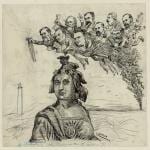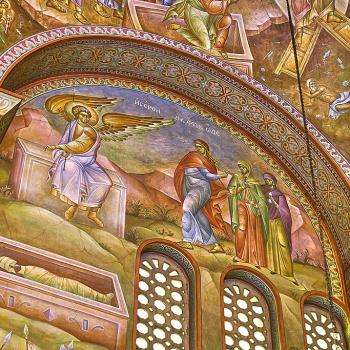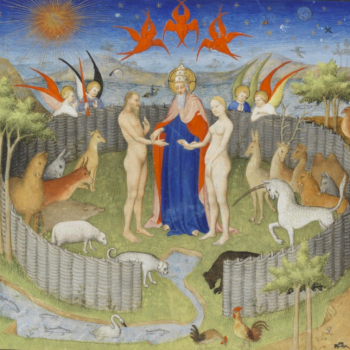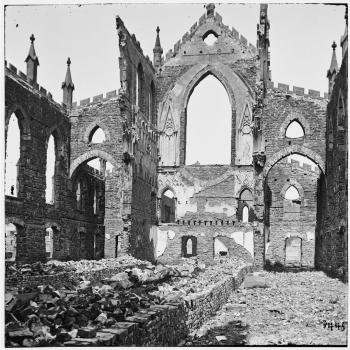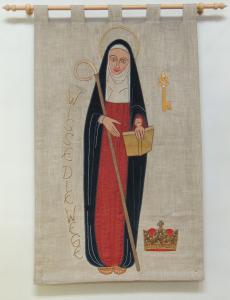
St. Hildegard of Bingen, even in her lifetime, was looked upon with amazement for her knowledge and wisdom, as well as her prophetic insight which gave her the kind of authority rarely held by women until the modern age. Nonetheless, she was a woman, and as a woman, she often had to fight for her rights as she often found herself in conflict with various ecclesial and secular authorities. As a woman, she was expected to be obedient to all her superiors, and do all that various priests and bishops told her to do. When she would not do so, she found herself often facing their wrath. This is exactly what happened when, in 1178 to 1179, she found herself in conflict with the clergy of Mainz. She had allowed a man whom the clergy believed had been excommunicated to be buried in hallowed ground; she believed, however, he had died in full communion with the church and it would be a sacrilege to have him moved. She would not obey the clergy when they told her to remove him from the cemetery he was interred, and so found herself, and the nuns under her direction, placed on interdict (being forbidden to receive the sacraments as well as to sing the divine office).
While she disagreed with the decision, and would not obey anyone who demanded she have the man’s body moved, she did obey the interdict. She believed it would be a great sacrilege if she did as the clergy demanded. The man had died, not only in communion with the church, but with his sins confessed and having received communion. When he died, no one objected to his receiving a proper Christian burial:
Therefore, we have not presumed to remove the body of the deceased inasmuch as he had confessed his sins, had received extreme unction and communion, and had been buried without objection. Furthermore, we have not yielded to those who advised or even commanded this course of action. Not, certainly, that we take the counsel of upright men or the orders of our superiors lightly, but we would not have it appear that, out of feminine harshness we did injustices to the sacraments of Christ, with which this man had been fortified while he was still alive. But so that we may not be totally disobedient we have, in accordance with their injunction, ceased from singing the divine praises and from participation in Mass, as had been our regularly monthly custom.[1]
It grieved her much to be under interdict; she wrote to the clergy of Mainz, she wrote to Archbishop of Mainz, and she wrote to the Archbishops of Cologne, asking for his help to have the decision reversed. She told the clergy of Mainz that if she did as they asked, she feared something worse would happen, as God, the True Light who inspired and directed her, wanted the man to remain buried where he was at:
Yet, only a few days after his burial, these man ordered us to remove him from our cemetery. Seized by no small terror, as a result, I looked as usual to the True Light, and, with wakeful eyes, I saw in my spirit that if this man were disinterred in accordance with their commands, a terrible and lamentable danger would come upon us like a dark cloud before a threatening thunderstorm.[2]
She did not entirely want to condemn the clergy of Mainz, but she hinted that their interdict threatens the dignity and honor due to God. She warned them that they must make sure that their cause was just, lest they suffer the consequences of their actions:
Therefore, those who, without just cause, impose silence on a church and prohibit the singing of God’s praises and those who have on earth unjustly despoiled God of His honor and glory will lose their place among the chorus of angels, unless they have amended their lives through true penitence and humble restitution. [3]
Indeed, as she wrote to the Archbishop of Mainz, Christian, she said it was unjust, because the man himself was no longer excommunicated. She had found proof of it. A knight who had known the deceased, was once excommunicated with him, but they had returned to the church at the same time, having their excommunications lifted. Not only did he know this, he was able to tell of the priest who was involved in the lifting of their excommunications, who was also willing to speak on the deceased’s behalf. Having such poof, she pleaded to Archbishop Christian to lift the interdict placed upon her and her nuns:
Therefore, most gentle father, for the love of the Holy Spirit and the piety owed to the eternal Father, who sent his Word into the womb of the Virgin to blossom there for the salvation of mankind, I beseech you not to look down upon the tears of your grieving and wailing daughters who out of fear of God are enduring the trials and perplexities of this unjust injunction. [4]
Archbishop Christian found himself in a tough situation; he knew Hildegard’s reputation and feared that if she truly were an oracle of the Living Light, as she claimed to be, he might suffer for what he had done. And so, once being shown the proof of the man’s excommunication had been lifted, he lifted the interdict, asking for her forgiveness, but not before chiding her a little for not looking for the proof of his innocence until after the interdict had been put in place. “You should have waited for definitive proof based on the suitable testimony of good men in the presence of the Church.” [5] Thus, having defended himself, saying he would have acted differently if he had been shown the man’s innocence, he told Hildegard her interdict was lifted and he hoped she would forgive him any pain and sorrow she experienced, because he was trying to do what was right as well:
Yet we wholeheartedly sympathize with your affliction, as is only right, and therefore we have written back to the church at Mainz to this effect: we grant you the privilege of celebrating the divine offices again, on the condition that proof of the dead man’s absolution has been established by the testimony of reliable men. In the meantime, saintly lady, if we have caused your annoyance in this matter, either out of guilt or ignorance, we earnestly beseech you not to withhold your compassion from one who seeks pardon. [6]
St. Hildegard’s experience was not unique. Many women, saints and non-saints alike, have often felt the wrath of clergy due to the fact that they questioned the decisions of the clergy. St. Mary MacKillop was excommunicated for several months, in part, because the order she helped establish, the Sisters of St. Joseph of the Sacred Heart, acted in ways contrary to the expectation and desires of various clergy. Also, it would seem, her exposing of sexual abuse, also caused many to despise her and work for her condemnation, creating false stories about her as a way to make her and her order look bad. She challenged the clergy, she found herself excommunicated, but the bishop who excommunicated her also restored her back into the church right before he died: did he do so because he was involved with her condemnation and spreading lies about her, and this was his way to repent of what he did, or because he had truly believed the stories and later believed them to be false and he wanted to exonerate her before he died? It is hard to tell – but what we can tell from the story of her life is that she, like St. Hildegard, and many other women throughout the centuries, found that when she challenged the clericalism of her day, she was the one who suffered, at least for a brief time, and it was easier to make this happen because she was a woman who was expected to be extra-obedient and silent when powerful men made demands of her.
God has shown us, through many saintly women who have spoken up throughout the centuries, that the “True Light” can and does speak through women. When God speaks, people need to listen, even the clergy who otherwise think themselves above such women. Standing for their rights, standing for the truth, standing for justice, might make people face harsh condemnation from the clergy, but women who know the truth know that they must stand by the truth even if it means, for a time, they find themselves in apparent conflict with the church. The church, after all, is far more than the clergy, and saints realize this. The church is the people of God. Clergy have a special role in the church, but it is not the only role, and indeed, the clergy are not the only people God uses to talk to the faithful. What God directs the people of God to do, they should do, even if clergy, stuck in their clericalism, try to put obstacles in their way. Saints will work with creative fidelity, as St. Hildegard did, knowing that it might mean for a time they will experiences trials and tribulations. St. Hildegard would not move the man from hallowed ground, though she would and did obey the interdict. She did not obey the clergy in all things, but she recognized their authority, and so obeyed where her conscience told her she should obey while warning those who fought against her that her trials and tribulations will last only for a short time, but if they did not repent, the consequences of their own actions will be worse for them than they are for her.
We must remember the example of many great and pious women throughout the centuries who found themselves ridiculed and abused because of their apparent lack of power; the truth, however, is stronger than earthly power and dominions. The light of truth will shine in the darkness and the darkness will find it cannot and will not contain it. Those who unjustly hold the pious back, under false pretenses, especially in order to reify their own personal power, will find that whatever suffering they cause for others will be far less than the suffering they will cause for themselves. Those who engage clericalism for gain will bring doom and destruction upon themselves, time and time again. The light of truth will reveal what is hidden, and judgment will come, once the truth is exposed. Those who try to use their power, to use their ecclesial authority, to hide the truth only make things worse; only by embracing the light of truth can the clergy free themselves from the stains of clericalism and open up to the reality of the church, a church which transcends them and which must include, not ignore, the voice of women, if the visible portion of the church does not want to fall under more condemnation in the future.
[1] St. Hildegard of Bingen, “Letter 23” in The Letters of Hildegard of Bingen. Volume I. Trans. Joseph L Baird and Radd K Ehrman (Oxford: Oxford University Press, 1994),76. [Letter to the clergy of Mainz].
[2] St. Hildegard of Bingen, “Letter 23,” 76.
[3] St. Hildegard of Bingen, “Letter 23,” 79.
[4] St. Hildegard of Bingen, “Letter 24” in The Letters of Hildegard of Bingen. Volume I. Trans. Joseph L Baird and Radd K Ehrman (Oxford: Oxford University Press, 1994),81-2. [To Christian, Archbishop of Mainz].
[5] St. Hildegard of Bingen, “Letter 24r” in The Letters of Hildegard of Bingen. Volume I. Trans. Joseph L Baird and Radd K Ehrman (Oxford: Oxford University Press, 1994), 83. [From Christian, The Archbishop of Mainz].
[6] St. Hildegard of Bingen, “Letter 24r,” 83.
Stay in touch! Like A Little Bit of Nothing on Facebook.
If you liked what you read, please consider sharing it with your friends and family!



